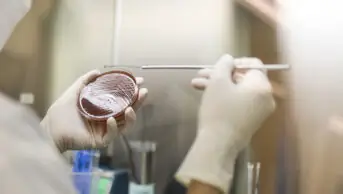
Shutterstock.com
The NHS must commit to national targets to use fewer antibiotics in a bid to halt the rise in antimicrobial resistance, according to a coalition of five health professional bodies in the UK.
The leadership organisations for pharmacists, GPs, hospital doctors and nurses are jointly calling for the NHS to set annual goals to reduce antibiotic use to 2010 levels.
The NHS now uses at least 6% more antibiotics than in 2010. Overuse of antibiotics has been linked to a rise in microbial resistance to commonly used medicines.
The coalition includes the Royal Pharmaceutical Society (RPS), the Royal College of General Practitioners (RCGP), the Royal College of Nursing (RCN), the Royal College of Physicians (RCP) and the Faculty of Public Health. They are working in collaboration with Public Health England and the Department of Health.
At a summit at the RPS in London on 6 November 2014, the coalition is warning that coordinated efforts to reduce inappropriate consumption of antibiotics are essential to avoid the drugs losing effectiveness. They want to see reductions in antibiotic use of around 1% each year, with progress measured against national targets agreed with government.
The latest figures on antimicrobial resistance, published in a Public Health England report [PDF] in October 2014, reveal that antibiotic prescribing in GP surgeries and hospitals rose 6% between 2010 and 2013. The number of bloodstream infections resistant to antibiotics has increased in this time, the report found. It also highlighted variation in antibiotic prescribing and usage rates across England, with higher resistance in areas with higher prescribing rates.
“I believe we will be able to meet these challenging targets by ensuring we all use antibiotics more carefully, and by fine-tuning or stopping the antibiotic when test results are known. Where an infection is proven, we need to complete the course of antibiotics,” says Philip Howard, consultant pharmacist in antimicrobials at the Leeds Teaching Hospitals NHS Trust and RPS spokesperson.
“This will lead to better patient care as well as reduced resistance. I believe these two aims are compatible and mutually supportive,” he adds.
Rose Gallagher, adviser for infection prevention and control at the RCN, wants to see robust quality measures to guide individual and collective efforts to reduce the risk of antimicrobial resistance.
Nigel Mathers, honorary secretary of the RCGP, says the NHS has developed a worrying reliance on antibiotics, and some patients now see them as a “cure-all”.
“Health professionals can face enormous pressure to prescribe them but all of our patients and the public need to be aware of the risks associated with inappropriate use of antibiotics and how to use them appropriately,” he says. “It is absolutely imperative that all of us — doctors, nurses and pharmacists — work in partnership with our patients to talk about when antibiotics are necessary and when they are not required. We should also be pointing out the alternatives available to those of our patients who ask for antibiotics to treat viral illnesses.”


